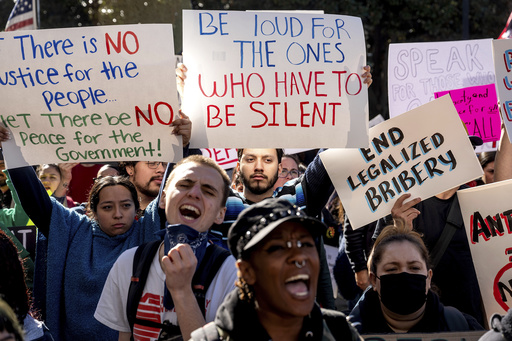WASHINGTON — A recurring scenario has surfaced since President Donald Trump’s return to the White House just weeks ago: he presents a controversial proposal, opponents swiftly respond with lawsuits, and a federal judge intervenes to suspend the initiative.
This pattern has materialized with Trump’s efforts to halt specific federal funding, challenge the notion of birthright citizenship, and displace government employees.
As his administration pushes the boundaries of executive power—often seeming to disregard existing laws—the pressing inquiry now is whether these court rulings will serve as mere obstacles or pose significant barriers to his agenda.
While Democratic leaders may find hope in the initial judicial pushback, the series of legal skirmishes is only beginning. Cases originating from more progressive areas such as Boston, Seattle, and Washington, D.C., could advance to the U.S. Supreme Court, where a conservative majority has shown a readiness to overturn established precedents.
“What is deemed constitutional hinges on the latest court ruling,” stated Philip Joyce, a public policy professor at the University of Maryland.
Already, approximately thirty lawsuits have been filed, including those from FBI agents concerned about politically motivated dismissals and families worried about newly imposed healthcare restrictions for transgender youth.
The judiciary has come under notable scrutiny due to the Republican-controlled Congress largely relinquishing its traditional role as a check on presidential power. Trump’s party has largely conceded to his requests to unilaterally make spending cuts and dismiss government watchdogs without required notifications, leaving the courts as the primary restraint on presidential ambitions.
“We are left with only two branches of government,” pointed out Justin Levitt, a professor at Loyola Law School.
Recent setbacks for Trump arose on Thursday. In Seattle, U.S. District Judge John Coughenour blocked Trump’s executive order concerning birthright citizenship, which aimed to prevent the automatic designation of U.S. citizenship for children of undocumented parents.
Coughenour remarked on birthright citizenship, established by the 14th Amendment, as being “a fundamental constitutional right,” and criticized Trump sharply, stating, “The rule of law is, according to him, something to navigate around or simply ignore, whether that be for political or personal gain.”
Reflecting on historical moments, he added, “There are periods in history where the world looks back and questions, ‘Where were the lawyers? Where were the judges?’ In such times, the integrity of the rule of law becomes particularly vulnerable. I refuse to let that beacon dim in our day.”
Coughenour had previously termed the order “blatantly unconstitutional” when issuing a temporary ruling, emphasizing, “I’ve been on the bench for over forty years; I cannot recall another case where the question was as unambiguous as this.”
Also on Thursday, in Boston, U.S. District Judge George O’Toole Jr. suspended Trump’s initiative encouraging federal employees to resign through paid leave. O’Toole, who was nominated by President Bill Clinton in 1995, did not provide a stance on the resignation program, which is generally regarded as a buyout, but he scheduled a hearing for the following Monday to deliberate on the matter.
“We firmly believe this program violates the law, and we will persist in vigorously defending our members’ rights,” stated Everett Kelley, National President of the American Federation of Government Employees.
The White House has indicated that around 40,000 federal employees have already confirmed their resignations in anticipation of pay until September 30.
“We are thankful to the judge for extending the timeline, allowing more federal employees who are choosing not to report to the office to take advantage of this exceptionally generous, once-in-a-lifetime offer,” said White House Press Secretary Karoline Leavitt in a statement.
The trajectory of these legal disputes toward the U.S. Supreme Court remains uncertain, as justices decide which cases to review. Trump has appointed three of the nine justices, and the court has maintained an expansive interpretation of presidential authority.
In a previous ruling concerning criminal charges against Trump, the justices concluded that presidents are shielded from prosecution for actions taken while in office.
Sonia Sotomayor, one of the few liberal justices, remarked that this could elevate the president to “a king above the law.”
Steve Vladeck, a professor at Georgetown University Law Center, indicated that courts have been pushing back against Trump in his current term. However, he cautioned that judicial rulings require enforcement.
“The absence of any congressional response is a foreboding sign for what may occur if this administration begins to overtly ignore court directives,” Vladeck warned.
Traditionally, such behavior would court political repercussions and lead to a president being susceptible to impeachment. Trump, however, was acquitted by the Senate amid two impeachment trials during his first term and successfully reelected, which appeared to diminish the likelihood of accountability.
One significant legal topic attracting attention involves the president’s authority to withhold legislatively approved funding—a process referred to as impoundment. Although this is restricted by legislation enacted in 1974 in response to issues related to former President Richard Nixon, some of Trump’s allies claim this law unconstitutionally limits executive authority.
This practice was brought to light when the Office of Management and Budget decided to freeze federal grants and loans while conducting a spending review based on ideological criteria.
U.S. District Judge Loren AliKhan, appointed by President Joe Biden in 2023, intervened, stating that “Defendants’ actions in this case potentially run roughshod over a ‘bulwark of the Constitution’ by interfering with Congress’s appropriation of federal funds.”
Copyright @2024 | USLive | Terms of Service | Privacy Policy | CA Notice of Collection | [privacy-do-not-sell-link]



